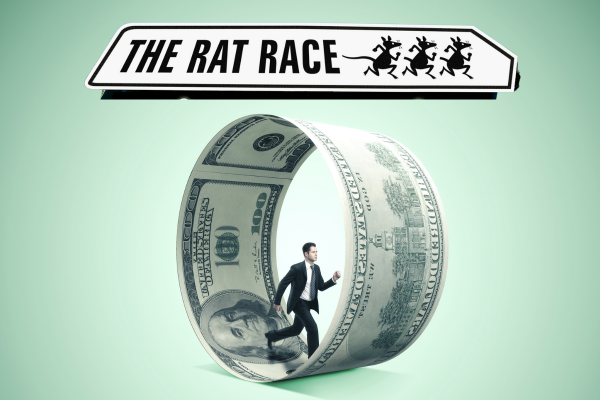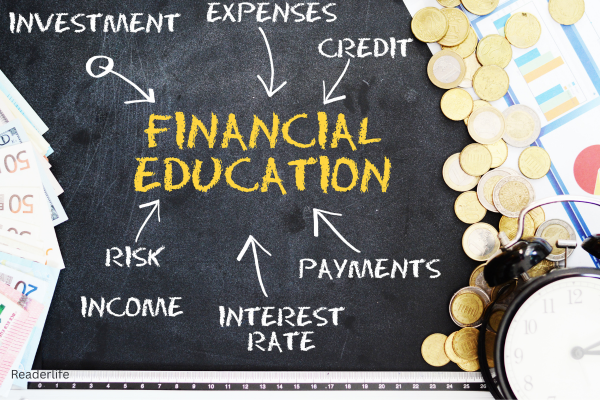When I first picked up Robert Kiyosaki’s “Rich Dad, Poor Dad,” I anticipated it would follow the typical pattern of personal finance books, offering standard advice like “save more” or “reduce unnecessary expenses, like coffee.” However, I soon discovered it presented a different perspective on financial education and wealth-building strategies.
I couldn’t have been more wrong.
Rich Dad Poor Dad didn’t just teach me about money — it flipped my entire way of thinking upside down.
The Rich Dad and Poor Dad are two very different father figures who shaped Robert’s understanding of wealth. His birth father, the Poor Dad, was a highly educated man who valued job security and climbing the corporate ladder. His best friend’s father, the Rich Dad, barely finished eighth grade but understood how to build and grow wealth. Rich Dad and Poor Dad use their opposing views to show that success isn’t about how hard you work but how smart you think about money.
The contrasting lessons from these two father figures shaped every decision Robert made about wealth, career, and life.
Table of Contents
11 Life-Changing Perspectives on Money and Success from the book Rich Dad Poor Dad
1. The Power of Thinking Differently
The first major lesson from Rich Dad Poor Dad is that your mindset shapes your financial future more than your job title ever will.
While Poor Dad taught that going to school, getting good grades, and landing a safe job was the ultimate goal, Rich Dad questioned everything.
Rich Dad asked, “Why work for money when you can make money work for you?”
This simple yet profound shift was a wake-up call for me and millions of readers worldwide.
2. Life Pushes Everyone — Winners Push Back
“Rich Dad Poor Dad teaches us an important lesson: life won’t wait for you to be ready. Life will challenge you, make things difficult, and sometimes disappoint you. What truly matters is whether you stand up again or stay down.
Poor Dad often blamed external factors for his problems, while Rich Dad took charge and adjusted his approach. To achieve enduring success, it is essential to respond with resilience when faced with life’s challenges.
3. The Opportunity Beyond the Rat Race

The “Rat Race” concept is a cycle in which people work hard to earn money, spend it all, and then work even harder to stay afloat.
I realised how easy it is to fall into this trap. The more you earn, the more you spend, thinking you’re advancing, but in reality, you’re just running faster on the same wheel.
Rich Dad Poor Dad taught me that escaping this race requires building assets — things that put money into your pocket without your constant effort.
4. The True Definition of an Asset
One thing Rich Dad Poor Dad drills into your mind is the importance of understanding assets and liabilities.
Before reading this book, I thought buying a house or a new car was a sign of wealth. But Rich Dad clarified that an asset is anything that earns you money; a liability is anything that costs you money.
This redefinition of wealth made me rethink every major financial decision. Knowing the true nature of what you own can drastically shift how you spend, invest, and plan for your future wealth.
5. Why Financial Education Matters More Than Academic Success

Rich Dad Poor Dad argues that traditional education teaches you to be a good employee but rarely teaches how to manage or grow money.
Kiyosaki highlights that being smart in school doesn’t guarantee financial intelligence.
Learning about investing, taxes, real estate, and business is far more critical if you want absolute freedom. A highly trained mind is the best investment you will ever make.
After this realisation, I committed myself to lifelong learning—not just for career growth but also for personal financial mastery.
6. The Courage to Take Risks
Another powerful lesson from Rich Dad Poor Dad is the role of risk-taking in wealth creation.
Poor Dad avoided risks because he feared failure. Rich Dad embraced calculated risks because he knew that’s where growth lives.
This mindset shift taught me that playing it safe is often the riskiest move.
Building wealth isn’t about avoiding mistakes — it’s about learning fast and getting back up smarter.
7. Money Is a Tool, Not the Goal
Through Rich Dad Poor Dad, Kiyosaki reminds us that money is not the end game.
Freedom, time, and choices are the real prizes.
Rich Dad didn’t hoard money; he used it to create systems that gave him the life he wanted.
This approach inspired me to view money not as something to chase but as something to master and put to work.
8. Building Wealth Starts Small
One of my favourite insights from Rich Dad Poor Dad is that anyone can start building wealth, no matter how little money they have.
It’s about making wise choices consistently, investing early, and letting compound growth do its magic.
Small beginnings lead to significant outcomes if you stay disciplined and curious.
If you enjoy deep financial insights, you might also like our summary of The Power of Habit!”
9. Don’t Work for Money — Make Money Work for You

One of the standout ideas in “Rich Dad, Poor Dad” is that the rich don’t work for money — their money works for them.
Most people wake up early, work hard all day, get paid, and spend everything, only to repeat the cycle. But Rich Dad taught that building assets, such as businesses, real estate, and investments, creates streams of income that don’t require constant labour. It’s a different game; learning to play is how you find true financial freedom.
10. Always Pay Yourself First
A big idea from “Rich Dad, Poor Dad” is the “pay yourself first” concept. Robert Kiyosaki discusses some money lessons from George S. Clason’s book The Richest Man in Babylon, which still ring true today. These lessons are basic but effective for managing your finances and building wealth.
The idea is to stash cash for savings and investments before paying bills or spending on other stuff. This habit helps secure your financial future, even when money gets tight. Prioritising savings not only enables you to feel more secure but also lets you start building your wealth. When you focus on saving, it becomes easier to manage your expenses and get ahead financially. Establishing good money habits is often more effective than just waiting around for luck to come your way.
11. Failure Isn’t the End — It’s a Step
In “Rich Dad Poor Dad,” failure isn’t something to be scared of; it’s a key part of growing. Winners see failure as a chance to learn instead of a loss. Every setback gives you a lesson and a way to get better.
Rich Dad always said it’s important to bounce back from mistakes quickly and learn from them. He believed that failing is just part of the journey and helps you grow stronger. So don’t sweat it—use those lessons to make smarter choices while chasing your goals!
Final Thoughts: The Lasting Influence of Rich Dad Poor Dad
Rich Dad Poor Dad is more than a book about earning money; it serves as a roadmap for living a fulfilling and liberated life.It challenges the traditional narrative that job security equals success, offering a new blueprint built on financial education, boldness, and intelligent risk-taking.
Reading Rich Dad Poor Dad opened my eyes to possibilities I never knew existed.
This book has given me a new perspective on wealth, a new paradigm for success, and, most importantly, the belief that financial freedom isn’t reserved for the lucky few —it’s available to anyone willing to learn and act.
If you’re serious about transforming your financial future, start with Rich Dad Poor Dad.
Let it be the spark that ignites your journey toward true freedom.


1 thought on “Rich Dad Poor Dad: 11 Life-Changing Perspective on Money and Success”